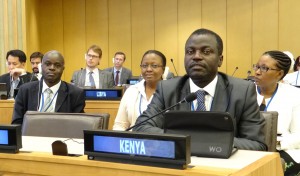Column: A commute between Kenya and the Hudson Valley
Highland Falls neighbors see Joshua M. Mugodo for a while, and then his captivating smile disappears from the neighborhood when he returns to his primary home in Kenya.
It”™s a long commute for the director of economic affairs for the Republic of Kenya”™s Ministry of Foreign Affairs and International Trade, who also served as minister counselor for the Kenya Mission to the United Nations until November 2013. He made a recent trip to New York to attend the 69th session of the U.N. General Assembly, returning to Kenya to pursue his assignment there.

- The Kenyan delegation, from left, Evans Maturu, Carolyn Musyimi, Joshua Mugodo and Harriet Nduma, at a session of the U.N. General Assembly”™s Open Working Group on Sustainable Development Goals in New York City in July. Photo courtesy International Institute for Sustainable Development
Highland Falls neighbors will continue to see him when he returns to make his reports to the U.N. and visit his three children, all college students in the U.S. His wife, Dolorence, remains in the area, doing volunteer work in the health sector.
The economic affairs director is serving his country as Kenya begins its second half-century of independence from Great Britain. The nation has come a long distance since he was a boy, he says, adding that it has a long way to go. He says Kenya is making social, economic and political progress with a view to improving the living standards of all. The new constitution emphasizes the need for sustainable development and the introduction of county government, and is immensely contributing to socio-economic gains in all corners of the country, he says.
Raised as a middle child in a family of 11, Mugodo recalls trips to fetch water from the river and to search for fire wood. Although his native tongue is Luhya, “We started learning English from the first day in school,” he says. “School consisted of seven years of elementary school and seven years of high school. Examinations were in English.”
Mugodo earned a bachelor”™s degree in economics from the University of Nairobi and a master”™s degree in economic integration and development from the Free University of Brussels. Then it was into government service, starting with the Ministry of Roads and later serving in other areas that broadened his knowledge of issues facing the country. He says the country is 90 percent Christian, 6 percent Muslim, and the remainder of the population is committed to other religions, including Buddhism.
In the U.N. he has pleaded for sustainable development and global partnership to address economic, environmental and social concerns.
Kenya is one of the few nations that can trace continuous life back to the Stone Age, he says. This is done by examining the evolution of tools discovered in its rich earth.
“We have recently discovered oil and coal, but we do not know yet how much,” the economic affairs director says.
“Landlocked neighbors depend on us for use of our port on the Indian Ocean,” he says. Fishing is an important part of the economy, he adds, pointing to the massive Lake Victoria. “Tilapia is a fish indigenous to the area and important to our economy,” he says.
Exports include coffee, tea, cloth and horticultural products, including exotic flowers, he says.
“Tourism is a major part of our economy,” Mugodo says. “We have land preserves for particular exotic animals, where they can be viewed and filmed in their natural habitat.”
“Why don”™t you come and see for yourself?” he says, impulsively inviting a new American friend.